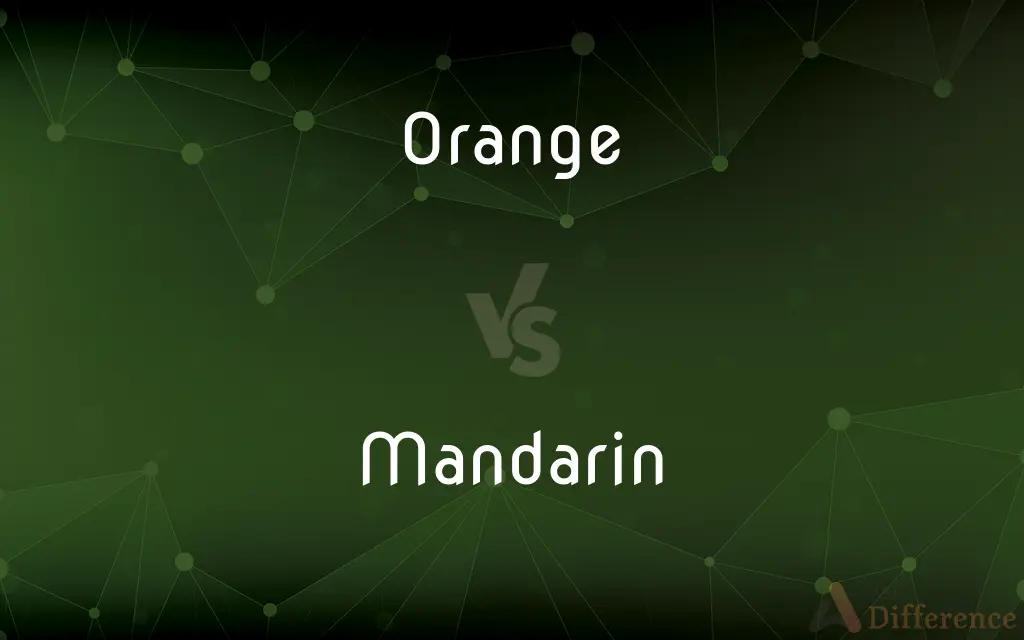Orange vs. Mandarin — What's the Difference?
Edited by Tayyaba Rehman — By Fiza Rafique — Updated on March 26, 2024
Orange refers to both the fruit and the color, generally larger and less sweet, while Mandarin is a smaller, sweeter type of orange.

Difference Between Orange and Mandarin
Table of Contents
ADVERTISEMENT
Key Differences
Oranges are a citrus fruit known for their vibrant color and a mix of sweet and tangy flavors. They come in various sizes and types, including navel, Valencia, and oranges, each with distinctive characteristics. On the other hand, Mandarins are a specific subgroup of oranges, smaller in size, with a sweeter taste and easier to peel skin. This category includes varieties such as tangerines, clementines, and Satsumas.
While oranges are often consumed both fresh and as juice, prized for their vitamin C content and refreshing taste, Mandarins are especially favored for fresh eating due to their sweet flavor and convenient, seedless varieties. Whereas the peel of an orange can be thick and somewhat difficult to remove, Mandarins have a thinner, looser skin that makes them particularly kid-friendly and a popular snack.
Oranges are widely used in cooking and baking, their zest and juice adding flavor to a variety of dishes and baked goods. Mandarins, while also used in culinary applications, are more likely to be found in salads, desserts, and as a sweet snack due to their higher sugar content and less acidic nature.
In terms of cultivation, oranges are grown in many parts of the world, thriving in warm, subtropical climates. Mandarins, while also versatile, have different varietal preferences for climate and soil, often requiring slightly different conditions than oranges to produce the best fruit quality.
Culturally, oranges have been a symbol of good fortune and prosperity, especially in Chinese culture, where they are a common gift during the Lunar New Year. Mandarins, particularly because of their sweetness and golden color, are also seen as a symbol of good luck and are often given as gifts during the same festival, but they hold a special place due to their auspicious association with wealth and happiness.
ADVERTISEMENT
Comparison Chart
Size
Generally larger
Smaller
Taste
Sweet to tangy
Sweeter
Peel
Thicker and harder to peel
Thinner and easier to peel
Use
Fresh, juice, cooking, baking
Fresh, salads, desserts
Compare with Definitions
Orange
Fruit.
The orange is a popular fruit known for its vitamin C content.
Mandarin
Sweet Flavor.
She preferred the sweet flavor of mandarins in her fruit salad.
Orange
Color.
The sunset turned the sky a beautiful shade of orange.
Mandarin
Symbol of Wealth.
Mandarins are often given as gifts during Lunar New Year for good fortune.
Orange
Symbol.
In many cultures, oranges symbolize good luck and prosperity.
Mandarin
Easy to Peel.
Kids love mandarins because they're so easy to peel.
Orange
Variety.
The Valencia orange is often used for making orange juice.
Mandarin
Type of Orange.
Mandarins are smaller and sweeter than most oranges.
Orange
Flavor.
She added orange zest to the cake for a citrus flavor.
Mandarin
Varieties.
Clementines are a seedless variety of mandarin that's perfect for snacking.
Orange
A town in southern France, on the River Rhône, home of the ancestors of the Dutch royal house.
Mandarin
Any of a group of related dialects of Chinese spoken principally in the north and west of China.
Orange
Relating to the Orange Order
Orange marches
Mandarin
The official national standard spoken language of China, based on the Mandarin dialect spoken in and around Beijing. Also called Guoyu, Putonghua.
Orange
Any of several evergreen trees of the genus Citrus of Southeast Asia, widely cultivated in warm regions and having fragrant white flowers and round fruit with a yellowish or reddish rind and a sectioned, pulpy interior, especially the sweet orange and the bitter orange.
Mandarin
A member of any of the nine ranks of high public officials in the Chinese Empire.
Orange
The fruit of any of these trees, having a sweetish, acidic juice.
Mandarin
A high government official or bureaucrat.
Orange
Any of several similar plants, such as the Osage orange and the mock orange.
Mandarin
A member of an elite group, especially a person having influence or high status in intellectual or cultural circles.
Orange
The hue of that portion of the visible spectrum lying between red and yellow, evoked in the human observer by radiant energy with wavelengths of approximately 590 to 630 nanometers; any of a group of colors between red and yellow in hue, of medium lightness and moderate saturation.
Mandarin
A mandarin orange.
Orange
Of the color orange.
Mandarin
Of, relating to, or resembling a mandarin.
Orange
Made from oranges.
Mandarin
Marked by elaborate and refined language or literary style.
Orange
Tasting or smelling like oranges.
Mandarin
(historical) A high government bureaucrat of the Chinese Empire.
Orange
(countable) An evergreen tree of the genus Citrus such as Citrus sinensis.
Mandarin
A pedantic or elitist bureaucrat.
Orange
(countable) The fruit of the orange tree; a citrus fruit with a slightly sour flavour.
Mandarin
A pedantic senior person of influence in academia or literary circles.
Orange
The colour of a ripe fruit of an orange tree, midway between red and yellow.
Mandarin
(ornithology) mandarin duck
Orange
Various drinks:
Mandarin
A senior civil servant.
Orange
(uncountable) Orange juice.
Mandarin
Ellipsis of mandarin orange:
Orange
(uncountable) An orange-coloured and orange-flavoured cordial.
Mandarin
A small, sweet citrus fruit.
Orange
(uncountable) An orange-coloured and orange-flavoured soft drink.
Mandarin
A tree of the species Citrus reticulata.
Orange
Having the colour of the fruit of an orange tree; yellowred; reddish-yellow.
Mandarin
(color) An orange colour.
Orange
(transitive) To color orange.
Mandarin
Pertaining to or reminiscent of mandarins; deliberately superior or complex; esoteric, highbrow, obscurantist.
Orange
(intransitive) To become orange.
Mandarin
A Chinese public officer or nobleman; a civil or military official in China and Annam.
Orange
The fruit of a tree of the genus Citrus (Citrus Aurantium). It is usually round, and consists of pulpy carpels, commonly ten in number, inclosed in a leathery rind, which is easily separable, and is reddish yellow when ripe.
Mandarin
A powerful government official or bureaucrat, especially one who is pedantic and has a strong sense of his own importance and privelege.
Orange
The tree that bears oranges; the orange tree.
Mandarin
A member of an influential, powerful or elite group, espcially within artistic or intellectual circles; - used especially of elder members who are traditionalist or conservative about their specialties.
Orange
The color of an orange; reddish yellow.
Mandarin
The form of the Chinese language spoken by members of the Chinese Imperial Court an officials of the empire.
Orange
Of or pertaining to an orange; of the color of an orange; reddish yellow; as, an orange ribbon.
Mandarin
Any of several closely related dialects of the Chinese language spoken by a mojority of the population of China, the standard variety of which is spoken in the region around Beijing.
Orange
Round yellow to orange fruit of any of several citrus trees
Mandarin
A small flattish reddish-orange loose-skinned orange, with an easily separable rind. It is thought to be of Chinese origin, and is counted a distinct species (Citrus reticulata formerly Citrus nobilis); called also mandarin orange and tangerine.
Orange
Any of a range of colors between red and yellow
Mandarin
Shrub or small tree having flattened globose fruit with very sweet aromatic pulp and thin yellow-orange to flame-orange rind that is loose and easily removed; native to southeastern Asia
Orange
Any citrus tree bearing oranges
Mandarin
A member of an elite intellectual or cultural group
Orange
Any pigment producing the orange color
Mandarin
Any high government official or bureaucrat
Orange
A river in South Africa that flows generally westward to the Atlantic Ocean
Mandarin
A high public official of imperial China
Orange
Similar to the color of a ripe orange
Mandarin
A somewhat flat reddish-orange loose-skinned citrus of China
Mandarin
The dialect of Chinese spoken in Beijing and adopted as the official language for all of China
Common Curiosities
What is the main difference between an orange and a mandarin?
The main difference lies in their size, sweetness, and ease of peeling, with mandarins being smaller, sweeter, and easier to peel.
Are all mandarins seedless?
Many mandarin varieties are seedless or have few seeds, but not all of them.
Do oranges and mandarins grow in the same climate?
Both thrive in warm, subtropical climates, but specific varieties may have different climate and soil preferences.
Can mandarins be used interchangeably with oranges in recipes?
While they can sometimes be substituted, their different sweetness levels and textures might affect the outcome of a recipe.
What are some popular dishes or desserts that feature mandarins?
Mandarins are often used in salads, desserts, and as garnishes for sweet and savory dishes.
How does the cultural significance of oranges and mandarins differ?
While both can symbolize good luck, mandarins, especially during the Lunar New Year, are specifically associated with wealth and happiness.
Why are mandarins easier to peel than oranges?
Mandarins have a thinner, more loosely attached skin, which makes them easier to peel.
What makes mandarins a popular snack for kids?
Their small size, sweetness, and ease of peeling make them particularly appealing to children.
How are oranges used in cultural traditions?
Oranges are often used as symbols of good luck and prosperity in various cultural traditions.
Can the peel of oranges and mandarins be used in cooking?
Yes, the zest of both can add flavor to dishes, though mandarin peel is less commonly used due to its thinner nature.
Are the nutritional benefits of oranges and mandarins similar?
Yes, both are rich in vitamins, particularly vitamin C, and offer similar health benefits, though their sugar content can vary.
Why might someone choose a mandarin over an orange?
Preferences for sweeter taste, smaller size, and easier peeling might lead someone to choose mandarins.
How do the flavors of oranges and mandarins compare?
Oranges have a wider range of flavors from sweet to tangy, while mandarins are generally sweeter and less acidic.
What are some health benefits of consuming oranges and mandarins?
They are high in vitamin C, fiber, and antioxidants, which can support immune function, improve skin health, and reduce the risk of chronic diseases.
Share Your Discovery

Previous Comparison
Contour vs. Bronzer
Next Comparison
Trip vs. PicnicAuthor Spotlight
Written by
Fiza RafiqueFiza Rafique is a skilled content writer at AskDifference.com, where she meticulously refines and enhances written pieces. Drawing from her vast editorial expertise, Fiza ensures clarity, accuracy, and precision in every article. Passionate about language, she continually seeks to elevate the quality of content for readers worldwide.
Edited by
Tayyaba RehmanTayyaba Rehman is a distinguished writer, currently serving as a primary contributor to askdifference.com. As a researcher in semantics and etymology, Tayyaba's passion for the complexity of languages and their distinctions has found a perfect home on the platform. Tayyaba delves into the intricacies of language, distinguishing between commonly confused words and phrases, thereby providing clarity for readers worldwide.















































